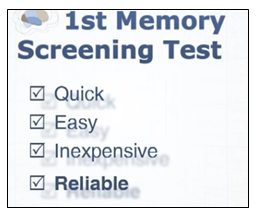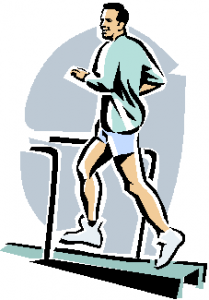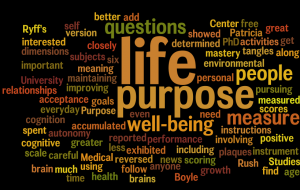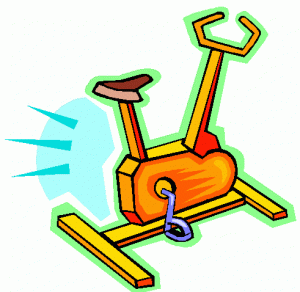Cognitive Vitality As We Get Older
 You will often hear that staying “mentally active” is important for maintaining a brain health as you age. A variation on the use it or lose it theme. But what exactly does being mentally active mean in this sense? Is reading a book OK and watching an action movie not?
You will often hear that staying “mentally active” is important for maintaining a brain health as you age. A variation on the use it or lose it theme. But what exactly does being mentally active mean in this sense? Is reading a book OK and watching an action movie not?
A new study tackles this question and the findings are interesting. Turns out activities such as – playing a game, listening to classical music or solving cross word puzzles – “probably won’t bring noticeable benefits to an aging mind”. That is an interesting claim as these types are activities are frequently sited as good examples of what should provide benefit.
The key is to engage in mental activities outside your comfort zone that force you to learn new skills. For example, learning photography or quilting. The general point is:
“It seems it is not enough just to get out and do something — it is important to get out and do something that is unfamiliar and mentally challenging, and that provides broad stimulation mentally and socially,…”
Doing mental activities that we have already mastered, while still worthwhile, may not be providing the brain boost and protection we need as we age.
Categories: Cognitive Decline, Cognitive Development, Lifestyle, Memory and Learning, Older Adult Tags:
More Items for Your Brain Foods List
 In the Next Brain blog we report on foods that offer some scientific promise of either protecting your brain health or improving cognitive performance. A list of 10 Top Foods to Boost Brainpower published by Forbes Magazine caught my eye. While it includes items typically found on such lists – for example blueberries, curry and walnuts – it also includes many I don’t normally see such as chickpeas, celery and crab.
In the Next Brain blog we report on foods that offer some scientific promise of either protecting your brain health or improving cognitive performance. A list of 10 Top Foods to Boost Brainpower published by Forbes Magazine caught my eye. While it includes items typically found on such lists – for example blueberries, curry and walnuts – it also includes many I don’t normally see such as chickpeas, celery and crab.
The claim about crab is particularly interesting. A serving exceeds your daily requirement of phenylalanine, an amino acid that is needed to create dopamine. I am going to do a little research into that and will blog my findings.
Source of image: openclipart.org
Categories: Cognitive Decline, Diet Tags:
More Evidence that Chocolate is Good for the Brain
 A recent study demonstrated that two cups of hot cocoa a day for a month improved brain health and thinking skills in the elderly. The study included 60 people who on average were in there 70s. Those participants with impaired blood flow showed an 8.3% percent improvement in blood flow and a 31% improvement in response time on a working memory test.
A recent study demonstrated that two cups of hot cocoa a day for a month improved brain health and thinking skills in the elderly. The study included 60 people who on average were in there 70s. Those participants with impaired blood flow showed an 8.3% percent improvement in blood flow and a 31% improvement in response time on a working memory test.
In more technical terms:
There is a strong correlation between neurovascular coupling and cognitive function, and both can be improved by regular cocoa consumption in individuals with baseline impairments. Better neurovascular coupling is also associated with greater white matter structural integrity.
Neurovascular coupling refers to the link between brain activity and the amount of cerebral blood flow. Better blood flow, better thinking. This is a new finding.
Participants consumed no other chocolate during the test.
Categories: Cognitive Decline, Diet, Memory and Learning, Older Adult Tags:
Free Test for Alzheimer’s Related Memory Loss
 As we age our memory changes. Sometimes it is hard to know if your experiences are natural “senior moments” or early warning signs of serious memory problems such as those related to dementia, mild cognitive impairment or early Alzheimer’s disease. MemTrax was developed to help address this issue. It is a simple visual memory test you can take in 1-4 minutes. Your score is easy to understand and if you take the test on a regular basis, say every month, you can see how it changes over time.
As we age our memory changes. Sometimes it is hard to know if your experiences are natural “senior moments” or early warning signs of serious memory problems such as those related to dementia, mild cognitive impairment or early Alzheimer’s disease. MemTrax was developed to help address this issue. It is a simple visual memory test you can take in 1-4 minutes. Your score is easy to understand and if you take the test on a regular basis, say every month, you can see how it changes over time.
The initial test is free and you can see how it works in this demo. You can take the test on from your computer, iPhone or iPad.
I am interested to hear from readers that use MemTrax or other instruments that screen for neurodegenerative memory decline.
Categories: Cognitive Decline, Memory and Learning, Older Adult, Software Tags:
The High Cost of Poor Brain Health
Dementia tops the cost of cancer or heart disease!
 In the Next Brain Blog we focus on evidence-based techniques that help you maintain or improve brain function and cognitive performance at all ages. Nature gave us a hind brain, mid brain and fore brain, and it is now up to us to use the latest science, technology and proven practices to create our Next Brain. Neglecting our brain fitness, especially as we age can lead to bad outcomes just as neglecting our physical health can. We increase the chance of age-related cognitive impairment, dementia and even Alzheimer’s disease.
In the Next Brain Blog we focus on evidence-based techniques that help you maintain or improve brain function and cognitive performance at all ages. Nature gave us a hind brain, mid brain and fore brain, and it is now up to us to use the latest science, technology and proven practices to create our Next Brain. Neglecting our brain fitness, especially as we age can lead to bad outcomes just as neglecting our physical health can. We increase the chance of age-related cognitive impairment, dementia and even Alzheimer’s disease.
A new study makes this point dramatically:
“The monetary cost of dementia in the United States ranges from $157 billion to $215 billion annually, making the disease more costly to the nation than either heart disease or cancer, according to a new RAND Corporation study. “
This makes poor brain health a big factor in the US healthcare crisis. More motivation for sticking with our next brain development efforts and encouraging others to do so too!
Source: Image
Categories: Cognitive Decline Tags:
The Impact of Physical Activity on the Brain
 Here in the Next Brain Blog we have reviewed many studies that demonstrate the impact physical activity has on brain function and cognitive performance. For example:
Here in the Next Brain Blog we have reviewed many studies that demonstrate the impact physical activity has on brain function and cognitive performance. For example:
Instant Memory Boost from Six Minutes of Exercise
Tai Chi Boosts Brain Volume and Performance
Exercise Once Weekly Helps Avoid Mental Decline
Short Weekly Walks Improve Intelligence
to list a few. And if that is not enough to convince you to include physical activity as part of your brain training efforts, a review of multiple research studies presented at a recent meeting of the American Association for the Advancement of Science found:
“Dozens of studies now show that aerobic exercise can increase the size of critical brain structures and improve cognition in children and older adults.”
I am interested to hear from readers that use physical activity to improve brain function and cognitive performance. What activities do you do? How frequent do you do them?
Categories: Child, Cognitive Decline, Lifestyle, Memory and Learning, Older Adult Tags: exercise
Purpose Boosts Mental Performance & Brain Health
Studies at the Rush University Medical Center involving over 1000 subjects:
“…showed that people who reported greater purpose in life exhibited better cognition than those with less purpose in life even as plaques and tangles accumulated in their brains,” said Patricia A. Boyle, PhD.”
This is great news for anyone interested in improving cognitive performance or maintaining brain health as they age.
 Purpose in life is determined by the meaning you get from everyday activities and how much of your time is spent pursuing goals that are important to you. It can be measured using Ryff’s well-being scale . The instrument measures well-being along six dimensions including autonomy, environmental mastery, personal growth, self acceptance, positive relationships with others and purpose in life. The questions that measure purpose in life are: 5,11,17,23,29,35 and 41. Be careful to follow the scoring instructions closely as the scores for some of the questions need to be reversed before you add them up.
Purpose in life is determined by the meaning you get from everyday activities and how much of your time is spent pursuing goals that are important to you. It can be measured using Ryff’s well-being scale . The instrument measures well-being along six dimensions including autonomy, environmental mastery, personal growth, self acceptance, positive relationships with others and purpose in life. The questions that measure purpose in life are: 5,11,17,23,29,35 and 41. Be careful to follow the scoring instructions closely as the scores for some of the questions need to be reversed before you add them up.
Categories: Cognitive Decline, Memory and Learning, Older Adult, Other, Problem Solving Tags:
Instant Memory Boost With 6 Minutes of Exercise
 Researchers at the University of California at Irvine have discovered a new brain boosting effect. Healthy and cognitively impaired subjects 50-85 years old were shown a series of positive images. Some of them rested while others exercised on a stationary bike at 70% capacity for six minutes. Then:
Researchers at the University of California at Irvine have discovered a new brain boosting effect. Healthy and cognitively impaired subjects 50-85 years old were shown a series of positive images. Some of them rested while others exercised on a stationary bike at 70% capacity for six minutes. Then:
“One hour later, the participants were given a surprise recall test on the previously viewed images. Results showed a striking enhancement of memory by exercise in both the healthy and cognitively impaired adults, compared with subjects who did not ride the bike.”
While the mechanism at work is not understood, the technique can easily be adapted by anyone looking to enhance memory performance: Intersperse your learning efforts with short bursts of moderately intense physical activity.
I am interested to hear from readers that use physical activity to get immediate improvements in cognitive performance.
Image Source: Stationary Bike
Categories: Cognitive Decline, Memory and Learning, Older Adult Tags:
Does Dental Hygiene Impact Brain Health?
 Can brushing your teeth, wearing dentures or otherwise taking care of your teeth and gums protect memory and brain health? One recent study suggests the answer is yes, and the impact can be significant:
Can brushing your teeth, wearing dentures or otherwise taking care of your teeth and gums protect memory and brain health? One recent study suggests the answer is yes, and the impact can be significant:
“It was found that men with inadequate oral hygiene habits who did not wear dentures had a 91% greater risk of dementia than those with adequate oral hygiene habits.”
The key health behaviors are regular brushing and visits to the dentist.
While more research in needed, this is the first study that I have seen that suggests dental health behaviors could be important to building or maintaining or your next brain.
I am interested to hear from readers about other studies. Are there other oral hygiene techniques we should consider as tools for improving brain function or cognitive performance?
Categories: Cognitive Decline, Lifestyle, Memory and Learning, Older Adult Tags:
Multivitamin Improves Memory in Older Men
 That is the conclusion of one study carried out on 51 men ages 50-74.
That is the conclusion of one study carried out on 51 men ages 50-74.
“The results showed multivitamin supplementation, compared to placebo, significantly improved recognition memory performance, although other cognitive function parameters did not differ between the treatment groups.”
The study goes on to suggest it might also help avoid age-related cognitive decline.
I am interest to hear from readers that use multivitamins to improve brain function or cognitive performance.
Categories: Cognitive Decline, Diet, Memory and Learning, Older Adult Tags: vitamins
